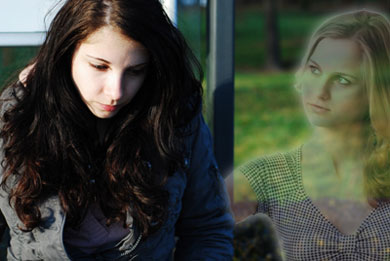Delve into the folk tales of any culture in the world, and before long you’ll come across ghost stories. The woman who lingers on the bridge where she jumped to her death. The lord of the manor who haunts his former home. Whatever other supernatural creatures catch readers’ attention and become the next hot thing in fiction, ghosts have always been, and are always, here. Whether they’re taking revenge on innocent victims or trying to atone for past wrongs, audiences never seem to tire of them.
As someone who’s written about ghosts more than once, I’ve found myself wondering why. The best answer I can come up with is, it’s because ghosts can mean so many things.
Comfort
Ghosts can be an antidote to grief. Knowing that a loved one is still around, in whatever form, makes death seem less final. As in the movie Truly Madly Deeply, it can replace—for a time—the companionship that was lost. Or the return from the dead may grant a chance to relive the past as it should have been. Harada of Taichi Yamada’s Strangers is filled with such joy when with the spirits of his long-deceased parents, who let him experience the unconditional childhood love he missed out on, that he finds it hard to care that those meetings are draining his own life away. Spending even a few more days in the presence of the dead may allow people to come to terms with what they’ve lost and or where they are in life, and ultimately find ways to move on.
The ghost of a family member, lover, or friend can also be a protector, seeing what we cannot (or will not). In Susan Palwick’s Flying In Place, Emma’s sister, though long dead, is the one who finally convinces her that she must stand up for herself and end the abuse instead of running farther and farther away. Cass’ ghostly friends in my own Give Up the Ghost warn her of enemies among her classmates and give her the ammunition she needs to put the peers who once tormented her in their places. Simply being the recipient of the special attentions of a ghost (which no one else can see or hear) can give one the strength to make it through a tough time.
Justice
Even after death, ghost stories suggest, rights can be wronged. If a terrible enough crime has been committed, our spirit will make sure it is revealed. The dead can set things right themselves, as in the movie Ghost, in which Sam investigates his death and uses his ghostly abilities to send both of his murders to their own demises. Or they can reach out to the living, who can take matters into their own hands. The ghostly Elijah of Saundra Mitchell’s Shadowed Summer is no expert at communicating, but he’s able to haunt Iris into discovering the secret of his death and finally laying his soul to rest.
There are quieter sorts of justice, too. Take Helen of Laura Whitcomb’s A Certain Slant of Light, who finally gets to experience the joys of youth and love decades after her traumatic death, and then is able to forgive herself. Similarly, the ghosts in Peter S. Beagle’s A Fine and Private Place find themselves gradually able to connect with each other in a way they never would have thought possible after what they went through in life—and to help the living man among them reach out to the world once more.
Fear
The frightening side of ghosts comes partly from their physical nature. You can’t hide from something you can’t see, that can slip through walls and fly through the air. A ghostly attacker cannot be imprisoned or killed—they may be both invincible and immortal. Unless their world also comes with Ghost Busters and their paranormal gadgetry, people have little recourse if a less-than-friendly ghost decides to target them.
Making ghosts even more scary are many of the same elements that seem like benefits in other circumstances. Justice is great when it truly is justice, but no one wants to run into a ghost like The Ring‘s Samara, obsessed with revenge and willing to take it out on anyone who accidentally lands in her sights. Or the haunted hotel of Stephen King’s The Shining, in which a host of sadistic spirits use their otherworldly perspective not to protect but to torment the winter caretakers into insanity.
Even ghosts that mean well can be horrifying, if they force you to face misdeeds you’d buried in the past, or simply painful memories. Give Up the Ghost‘s Cass may enjoy the company of ghosts, but sharing her room with her long-dead sister also forces her to remember feelings she’d rather put behind her, like the guilt she’s never quite been able to let go of. In Geoff Ryman’s Air, Chung Mae finds herself living with a dead woman in her head, suddenly responsible for not one life but two. And the ghosts themselves are not exempt. Darroti of Susan Palwick’s The Necessary Beggar seeks death in order to flee his pain and guilt, only to find himself even more trapped when he returns to the world as a spirit.
Protectors, avengers, attackers—it’s amazing how many roles ghosts can fill. But then, it’s no fewer than the roles we ourselves can fill as human beings. Perhaps the most important aspect of ghosts is that they could be any one of us. If we assume they exist, how many of us will be transformed into a vampire, werewolf, or faerie? Even in fiction, not many. But all of us, and all of our loved ones, will one day die. And then any one of those ghost stories could be our own.
Megan Crewe is a Canadian young adult author whose first novel, Give Up the Ghost, was recently published by Henry Holt Books for Young Readers.










